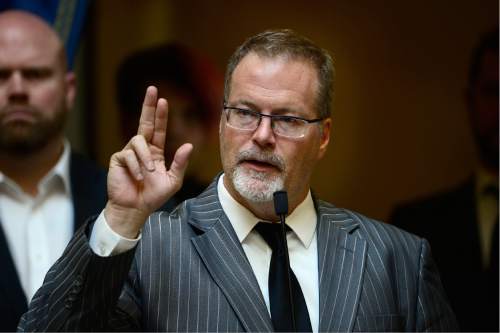This is an archived article that was published on sltrib.com in 2016, and information in the article may be outdated. It is provided only for personal research purposes and may not be reprinted.
"The fault, dear Brutus, is not in our stars, But in ourselves."
— William Shakespeare, "Julius Caesar"
The sponsor of the bill that would have given the Utah hate crimes law some real teeth was understandably downcast the other day when the religion to which he belongs, The Church of Jesus Christ of Latter-day Saints, put out the hit on his proposal.
Sen. Stephen Urquhart, R-St. George, must know how to count votes after 15 years in the Legislature. He figures at least three senators bailed on him after the church issued a vaguely worded, but clearly intended, statement about not upsetting something it called "the delicate balance" of last year's anti-discrimination law.
Had Urquhart held those votes, passage was likely. Without them, no chance.
Urquhart is retiring from the Senate at the end of this year, so this may have been his last shot to get this worthy measure through. It's no surprise, then, that he was very disheartened about it.
The church, he said the church shouldn't be the "arbiter" of legislation, signaling a final thumbs-down from above, without giving him a chance to negotiate or even explain.
Arguing that the LDS Church does not have an outsized influence over public policy in Utah would be absurd.
But putting the blame for bad decisions by individual public officials on the church — or the Koch brothers or the PTA or any other Marching and Chowder Society — goes way too easy on the lawmakers involved.
Adults in positions of power who thought on Monday that a bill was a good idea, then voted against it on Wednesday because of what a church said on Tuesday, should never be given an easy out.
The "I was only following orders" excuse should never be accepted.
By law and by right, churches and corporations and friendly societies and newspapers can say any damn fool thing they like. People, voters and, especially, elected officials are expected to weigh all that and decide based on the merits of any argument, not who argued it.
Otherwise, free speech just doesn't work.
A senator or representative who only says, "How high?" when a church or corporation or lobbyist says, "Jump," is just flat not fit for public office. If the voters cannot see that, and replace the official, it's their fault.
Of course, the church's argument against Urquhart's bill was bogus from top to bottom.
Saying that it would undo last year's compromise on anti-discrimination legislation makes no sense at all. The protections in the bill favored no faith, race, ethnicity, sexual orientation or favorite sports team over any other.
And the contention that it would be a violation of anyone's freedom of religion to add a level of jail time to any violent act that could be tied to animus toward a particular group — which is all Urquhart's bill would have done — only makes sense if religious freedom means the right to be a vandal, a bully, a brute.
But then, this is a state where the law does little or nothing to interfere with various colonies of people who claim the religious freedom, generation after generation, not just to marry multiple women, which is the least of it, but to rape one another's daughters, profit from unpaid child labor, defraud the federal government of millions in welfare benefits.
Oh, nobody in power up and says that freedom of religion covers that multitude of sins. But there seems no other explanation for the state's utter inability to do anything about decades of horrid abuse that we'd be aghast at if we read about it happening in Uganda or Bangladesh.
Finally, the feds are taking some action, but only on relatively limited charges that are clearly federal crimes, like official discrimination and food stamp fraud. It's being called the Al Capone Treatment, the feds convicting someone of something boring like tax evasion when the state laws against kidnapping and assault aren't being enforced.
Religious people have the right to speak and seek a redress of grievances, not because they are religious, but because they are people. But when we so much as suggest that religion closes an argument (it's not so good to say "trumps" these days) we get a situation where thought is foregone and disgraceful things are forgiven.
That's what Sen. Urquhart is upset about. And he should be.
George Pyle, a Tribune editorial writer, claims the inalienable religious right to watch hour after hour of college basketball. gpyle@sltrib.com



